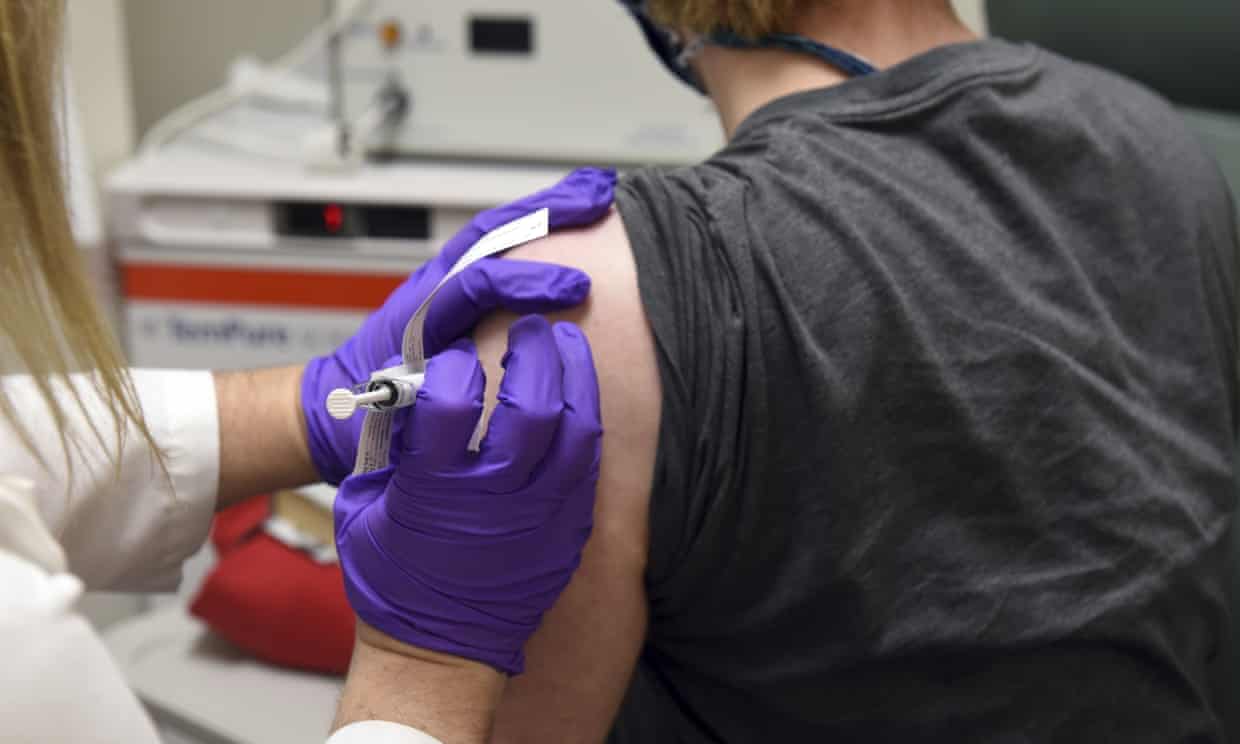
Coronavirus outbreak
Just half of Americans plan on getting Covid-19 vaccine, poll shows
The US could run up against another obstacle in its fight against coronavirus: vaccine refusal
by Tom McCarthyOnly about half of Americans say they would get a Covid-19 vaccine if available, according to an Associated Press-NORC poll, as a top US government scientist tempered claims by Donald Trump that the United States would be able to invent, manufacture and administer hundreds of millions of vaccine doses by the end of the year.
Trump has routinely touted the speedy development of a vaccine as America’s path out of the coronavirus pandemic, which has taken nearly 100,000 lives in the US. As part of an effort branded “Operation Warp Speed”, Trump has set a goal of a 300m-dose stockpile by January.
Vaccine developers have called that time frame “aspirational”. But polling published on Wednesday indicates that the country could run up against another obstacle in its fight against the virus: vaccine refusal.
In reply to the question, “If a vaccine against the coronavirus becomes available, do you plan to get vaccinated?”, 49% of respondents said yes and 20% said no. About one-third said they weren’t sure.
Most epidemiologists believe that either a 50-60% infection rate, or a vaccine, would be required to stop the spread of the virus in the United States. Current infection rates vary regionally from an estimated 5% to 20%.
Public attitudes towards a vaccine could change quickly if a vaccine or vaccines were unveiled with a public education campaign. But the polling figures reflected US attitudes toward common vaccines such as the flu vaccine, which has about a 50% uptake rate each year.
In previous years, Trump has added his voice to the anti-vaccination movement in the United States, falsely linking vaccines with autism. The movement has contributed to outbreaks of measles in the United States and raised fears about the potential return of eradicated diseases such as smallpox.
Early clinical trials from multiple vaccine candidates have been promising. But Dr Anthony Fauci, the country’s top infectious diseases expert and a member of the White House coronavirus taskforce, warned in an interview with CNN on Wednesday that the road to a vaccine could have unforeseen detours.
Asked whether a vaccine would be widely available in the United States “before the end of the year,” Fauci said “it is possible.
“But when you’re dealing with vaccines, you’ve got to remember that you’re dealing with things that have a lot of vicissitudes,” Fauci said. “There are a lot of landmines and hiccups that occur.
Fauci said that scientists were accelerating the vaccine development process “which I must emphasize is not at the expense of safety nor at the expense of scientific integrity.
“I still think that we have a good chance, if all the things fall in the right place, that we might have a vaccine that would be deployable by the end of the year, by November-December,” he said.
Respondents in the poll told the Associated Press said they were concerned about the vaccine development process being rushed. The record time for developing an entirely new vaccine is at least four years.
“I am not an anti-vaxxer,” said Melanie Dries, 56, of Colorado Springs, Colorado. But, “to get a Covid-19 vaccine within a year or two ... causes me to fear that it won’t be widely tested as to side-effects.”
Dr Francis Collins, who directs the National Institutes of Health, insisted safety was the top priority. The NIH is creating a master plan for testing the leading Covid-19 vaccine candidates in tens of thousands of people, to prove if they really work and also if they’re safe.
“I would not want people to think that we’re cutting corners because that would be a big mistake. I think this is an effort to try to achieve efficiencies, but not to sacrifice rigor,” Collins told the AP earlier this month.